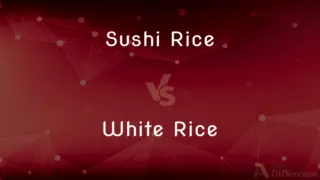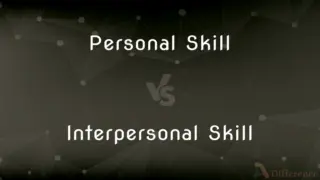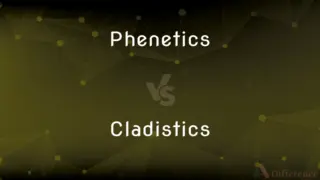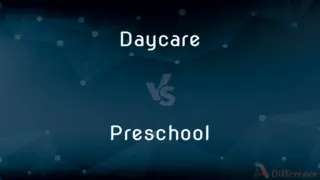Baboon vs. Buffoon — What's the Difference?
By Tayyaba Rehman & Maham Liaqat — Updated on March 20, 2024
A baboon is a large monkey known for its intelligence, while a buffoon is a person who behaves comically or foolishly.

Difference Between Baboon and Buffoon
Table of Contents
ADVERTISEMENT
Key Differences
Baboons are primates belonging to the genus Papio, part of the Old World monkey family. On the other hand, a buffoon refers to a person who amuses others by acting in a ridiculous or foolish manner, often deliberately. The term can be used to describe a professional entertainer who specializes in comic roles or anyone behaving in a clownish or absurd way, not to be taken seriously.
While baboons play a significant role in their ecosystems as both predators and prey, contributing to the balance of their environments, buffoons' impact is more cultural or social, often seen in entertainment or as a critique of someone's behavior. Baboons, despite their sometimes aggressive behavior, are complex creatures with intricate social structures and behaviors, including grooming habits that reinforce social bonds. In contrast, being called a buffoon typically carries a negative connotation, implying a lack of seriousness or intellect.
The intelligence of baboons is notable, with studies showing their ability to understand abstract concepts, use tools, and exhibit problem-solving skills. This contrasts with the portrayal of buffoons, who are characterized by their lack of wisdom and propensity for making foolish decisions, often for comedic effect. However, both baboons and buffoons can evoke laughter, whether through the natural antics observed in the former or the exaggerated, often self-deprecating humor associated with the latter.
Understanding the differences between these terms not only highlights the characteristics of a specific animal species but also reflects on human social behavior and cultural practices involving humor and entertainment. While one symbolizes a wild, intelligent animal adapted to diverse environments, the other represents a human tendency toward humor, sometimes at one's own expense.
Comparison Chart
Definition
A large monkey known for its intelligence and social complexity.
A person who behaves comically or foolishly, often to amuse others.
ADVERTISEMENT
Role
Part of the ecosystem, contributing to environmental balance.
Cultural or social, often related to entertainment or criticism.
Characteristics
Long muzzles, powerful jaws, cheek pouches, sharp teeth.
Characterized by ridiculous or exaggerated behavior.
Behavior
Omnivorous, lives in hierarchical troops, uses tools.
Acts foolishly or comically, sometimes as a professional role.
Connotation
Respected for intelligence and adaptability.
Often negative, implying a lack of seriousness or intellect.
Compare with Definitions
Baboon
A member of the genus Papio, known for social complexity.
The baboon troop was observed using tools to access food.
Buffoon
A person who amuses others by acting foolishly.
The court jester was considered a skilled buffoon.
Baboon
Omnivorous primates with diverse diets.
Baboons can eat fruits, grasses, and occasionally small animals.
Buffoon
Often used to describe someone not to be taken seriously.
His antics at the meeting made him look like a buffoon.
Baboon
Characterized by their large size and distinctive features.
Baboons have powerful jaws and long, dog-like muzzles.
Buffoon
Can refer to a professional comic entertainer.
The play featured a lovable buffoon who constantly got into humorous mishaps.
Baboon
Baboons are primates comprising the genus Papio, one of the 23 genera of Old World monkeys. There are six species of baboon: the hamadryas baboon, the Guinea baboon, the olive baboon, the yellow baboon, the Kinda Baboon and the chacma baboon.
Buffoon
A clown; a jester
A court buffoon.
Baboon
Any of several large terrestrial African and Arabian monkeys of the genus Papio, having an elongated doglike muzzle and bare calluses on the buttocks.
Buffoon
A person given to clowning and joking.
Baboon
(Slang) A brutish person; a boor.
Buffoon
A ludicrous or bumbling person; a fool.
Baboon
An Old World monkey of the genus Papio, having dog-like muzzles and large canine teeth, cheek pouches, a short tail, and naked callosities on the buttocks. 13
Buffoon
One who acts in a silly or ridiculous fashion; a clown or fool.
Baboon
A foolish or boorish person.
Buffoon
(pejorative) An unintentionally ridiculous person.
Baboon
One of the Old World Quadrumana, of the genera Cynocephalus and Papio; the dog-faced ape. Baboons have dog-like muzzles and large canine teeth, cheek pouches, a short tail, and naked callosities on the buttocks. They are mostly African. See Mandrill, and Chacma, and Drill an ape.
Buffoon
To behave like a buffoon
Baboon
Large terrestrial monkeys having doglike muzzles
Buffoon
A man who makes a practice of amusing others by low tricks, antic gestures, etc.; a droll; a mimic; a harlequin; a clown; a merry-andrew.
Buffoon
Characteristic of, or like, a buffoon.
To divert the audience with buffoon postures and antic dances.
Buffoon
To act the part of a buffoon.
Buffoon
To treat with buffoonery.
Buffoon
A rude or vulgar fool
Buffoon
A person who amuses others by ridiculous behavior
Common Curiosities
Can a baboon be a buffoon?
Literally, no. Baboons are animals and cannot take on human roles. However, their behaviors might be amusing to humans, metaphorically likening them to buffoons.
Is being called a buffoon always negative?
Often, yes, as it suggests foolishness or lack of seriousness. However, in the context of entertainment, it might be more neutral or even positive.
How do baboons communicate?
Baboons communicate through a variety of vocalizations, body postures, and facial expressions, reflecting their complex social structures and behaviors.
Why is baboon society considered complex?
Baboon society is complex due to its hierarchical structure, social interactions, grooming behaviors, and cooperative strategies for survival and reproduction.
What historical figures were known as buffoons?
Throughout history, court jesters or fools were professional entertainers known for their buffoonery, playing a critical role in medieval and Renaissance courts.
Can the term "buffoon" be used affectionately?
Yes, in some contexts, "buffoon" can be used affectionately to describe someone's endearing foolishness or to tease friends and family lightly.
How does the role of a buffoon differ across cultures?
The role and perception of buffoons vary significantly across cultures. In some, they are revered as clever commentators on society's flaws, using humor to convey critical messages, while in others, they are simply seen as sources of amusement and entertainment.
Do baboons have a sense of humor?
While baboons display complex behaviors, interpreting these as a sense of humor akin to humans' is anthropomorphizing. They do engage in play, which can appear humorous to observers.
How do baboons contribute to their ecosystem?
Baboons play a crucial role in their ecosystem by aiding in seed dispersal through their omnivorous diet, controlling insect populations, and serving as prey for larger predators, thus maintaining ecological balance.
What adaptations do baboons have for their lifestyle?
Baboons have several adaptations, including their strong and sharp canine teeth for defense and feeding, cheek pouches for storing food while foraging, and highly developed brains that support complex social structures and problem-solving abilities.
Can buffoons be intelligent?
Yes, portraying a buffoon, especially in a professional entertainment context, can require significant intelligence, wit, and understanding of social cues and comedy.
Are there any famous literary or fictional baboons?
Yes, notable fictional baboons include Rafiki from "The Lion King," who is wise and serves as a shamanistic figure, and the baboons in Rudyard Kipling's "The Jungle Book," known for their lawless behavior.
Has the definition of a buffoon changed over time?
Historically, buffoons or jesters had a nuanced role, often allowed to speak truth to power under the guise of humor. Today, the term more commonly refers to anyone who behaves in a foolish, comical manner, indicating a shift from a specific societal role to a more general description of behavior.
Share Your Discovery

Previous Comparison
Employment vs. Unemployment
Next Comparison
Coconut vs. CophaAuthor Spotlight
Written by
Tayyaba RehmanTayyaba Rehman is a distinguished writer, currently serving as a primary contributor to askdifference.com. As a researcher in semantics and etymology, Tayyaba's passion for the complexity of languages and their distinctions has found a perfect home on the platform. Tayyaba delves into the intricacies of language, distinguishing between commonly confused words and phrases, thereby providing clarity for readers worldwide.
Co-written by
Maham Liaqat














































